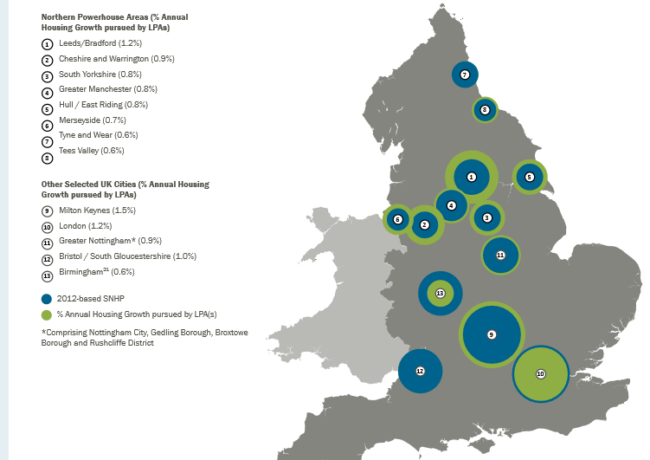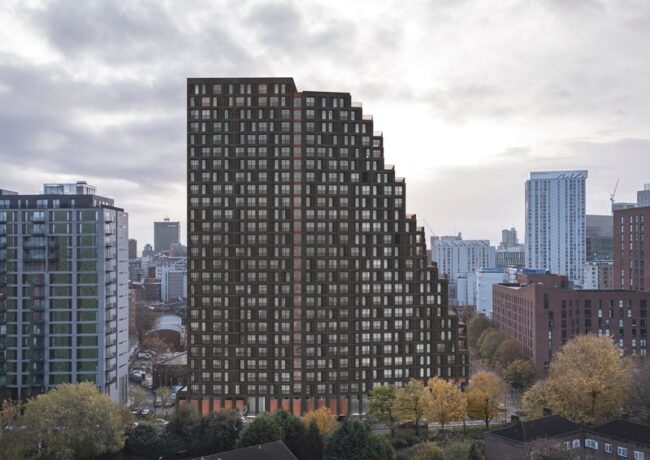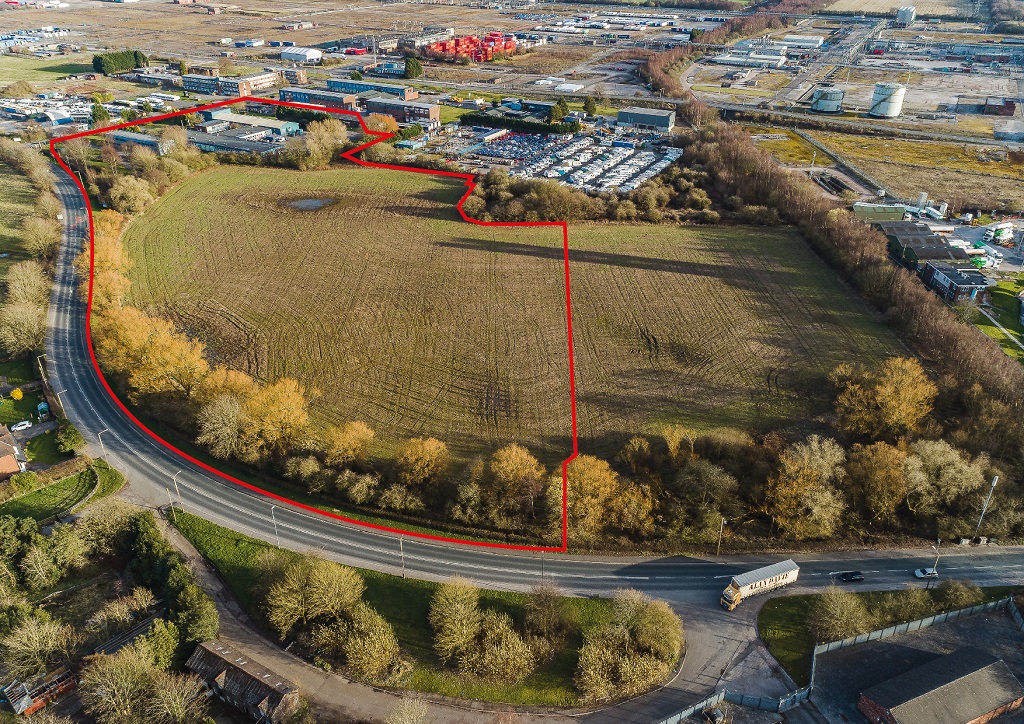Manchester ‘on verge of London-style housing crisis’
A new report by NLP and the Housing the Powerhouse campaign, endorsed by Greater Manchester Chamber of Commerce, warns of serious risks facing the city region in the next 20 years which could derail its position as the engine of the Northern Powerhouse.
The report’s authors claim Greater Manchester’s “current growth, infrastructure investment and ambitious rhetoric are not yet being matched by its planning, housing and development strategy…Greater Manchester risks lagging behind other Northern cities in its housing ambitions, including Leeds, Bradford and Sheffield.”
Colin Robinson, planning director at NLP, said: “Our research demonstrates that for the Northern Powerhouse aspirations to become a reality, Greater Manchester must pursue more ambitious, higher levels of housing and employment growth than are currently being proposed in the emerging Greater Manchester Spatial Framework.”
The report, Greater Manchester – The Engine Driving the Powerhouse? was produced by planning and economic consultants Nathaniel Lichfield & Partners and commissioned by the Housing the Powerhouse campaign, made up of housebuilders and other planning advisors. The report finds Greater Manchester’s housing targets (0.8% annual growth as outlined in the emerging Greater Manchester Spatial Framework) are currently below the levels planned by Leeds & Bradford (1.2%), Greater Bristol (1%) and Greater Nottingham (0.9%), “raising questions about whether Greater Manchester’s ambitious rhetoric is matched by the reality of its decision-making.”
The report was launched by Jim McMahon, former leader of Oldham Council and now MP for Oldham West & Royton, at an event on Friday morning in central Manchester.
McMahon said: “The Chancellor’s so-called Northern Powerhouse feels more like a Poorhouse in towns like Oldham where the government is devolving responsibilities whilst cutting resources to the bone. Done right, devolution can empower our communities. Done wrong, it’s just cover for cuts.
“In Oldham, people aren’t impressed by hollow exercises in political branding. George Osborne’s rhetoric goes down badly because it does not come with real freedoms or with genuine financial reform.
“A priority for housing policy should be to get much more out of some of Greater Manchester’s private landlords in return for the Housing Benefit that they receive. In Oldham, too many are happy to take Local Housing Allowance payments whilst letting their tenants’ homes fall into ruin. Housing the Northern Powerhouse must mean tackling problems like that.”
Steve Burne, vice president of the Greater Manchester Chamber of Commerce and chief executive of AEW Architects, added: “This report highlights what is increasingly evident to businesses in Greater Manchester – that we are on the verge of a major housing crisis if action is not taken soon. House prices and rents are rising rapidly in many parts of the city, and businesses are struggling to attract and retain the skilled staff needed to grow the economy. This was demonstrated by our recent survey of Chamber members which showed over 60% think building more family and affordable homes should be a priority.
“We urge the Greater Manchester Combined Authority to take a strong lead and show the way for the rest of the Northern Powerhouse by developing an ambitious housing and development strategy for the next 20 years.”
The report also draws comparisons with other European cities, such as Nantes and Dortmund, where ambitious housing plans and pro-growth strategies have helped to develop strong and successful economies.
Matthew Good of the Home Builders Federation and member of the Housing the Powerhouse campaign said: “If the dream of a Northern Powerhouse is to be turned into reality a step change in the delivery of new homes in Greater Manchester will be key. The Greater Manchester Spatial Framework is fundamental to this and provides a once in a generation opportunity for the development of a clear, pro-growth strategy to be implemented.
“This report shows the way forward for Greater Manchester and the lessons it can learn from other successful places when it comes to providing the homes we need for a growing population.”
The Housing the Powerhouse campaign believes housing targets in Greater Manchester should be increased through the GMSF to reflect the region’s role as the engine of the Northern Powerhouse. The draft GMSF is due to be published for consultation in the autumn.
The Housing the Powerhouse campaign says without higher housing targets families will be forced to move away from the city in search of suitable accommodation. There would be a stranglehold on growth, forcing house prices up and pushing productivity down. And Greater Manchester’s position as the engine of the Northern Powerhouse would be put at risk; other city regions such as Leeds and Sheffield propose more ambitious plans. The campaigners say the expected modest targets would fail to provide enough affordable housing for the 85,000 people on social housing waiting lists in Greater Manchester.
The campaign was formed in 2015 and is backed by the Home Builders Federation, Greater Manchester Chamber of Commerce, and comprised of Barratt Homes, Bloor Homes, David Wilson Homes, the Emerson Group/Orbit Developments, Gladman Developments, HIMOR Group, Jones Homes, The Peel Group and Taylor Wimpey UK.
Today’s report says the GMSF objectively assessed need (OAN) document proposed a total of 217,350 net additional homes, equating to 10,350 per year, lower than the 10,700 outlined in last year’s initial evidence base consultation, equating to an average increase in dwellings of just 0.8% a year; Housing the Powerhouse proposes a target of 16,000 new homes a year in the GMSF. This would mean a total of 64,000 more homes by 2035 than if the target was 10,350 a year outlined in the latest Objectively Assessed Need document – meaning more growth and jobs, and helping to retain skilled people in Greater Manchester’s Northern Powerhouse economy.
The full report can be read here and more information on the Housing the Powerhouse campaign can be found at www.housingthepowerhouse.com





Is this a case of “Eyes too big for it’s mouth”, or just another canny marketing piece.
By Man on bicycle
Engine of the northern powerhouse. Place needs tidying up first before it represents the north. It’s a dump.
By lukewarm
I agree with lukewarm, the North West is a dump, Yorkshire is nice though.
By Kurt
How do Housing the Powerhouse know what the GMSF is going to be saying? So far the councils have only consulted on 3 options – one equal to the current targets (which aren’t being met), one exceeding the growth of London (which Housing the Powerhouse put forward) and one in the middle which just exceeds meeting housing need. I don’t think they’ve actively said they favour taking one forward ahead of any other.
Rather suspect they have different ideas about what it should deliver as well – the issues that Jim McMahon wants resolving in places like Oldham wont get addressed by building thousands of undersized family houses on oversized plots with limited social/community and transport infrastructure on green fields in Trafford and Stockport.
By Interested party
Typical example of developers and landowners talking up the figures to necessitate Green Belt and profitable open land release around Greater Manchester. The scale of development needs a serious reality check, there have to be very considerable doubts that the market exists and there is capacity in the development industry. It will result in very good pickings in developer profits, increased congestion as people drive from peripheral suburban sprawl and acres of brownfield land left to rot. Given house prices have yet to return to pre-recession levels in many areas the headline is simply sensationalist rubbish.
By cynical planner
Key word is employment. Without significant employment growth in the right sectors, you wont have the population draw so you wont need loads of housing. Also I don’t think you can compare this to London. London is a global city where the rich park their cash. So as a first time buyer you are up against a whole raft of investors. Massive supply of London apartments is in the £1000 psf price bracket. Those on an average wage are in trouble – they cannot afford to live even close to the capital. THIS IS A MASSIVE OPPORTUNITY FOR MANCHESTER. People will have no choice but to leave London. Where will they go? Where the jobs are. Manchester must create the right jobs. Then everything will fall into place.
By Realist Surveyor
Liverpool City Region has some lovely old properties in really attractive areas at affordable prices: Wallasey near Liverpool Bay; Sefton Park; Princes Park; Sefton coast, etc. – all with good rail connections to city centre and waterfront. Liverpool can provide more of the Powerhouse jobs, and the environment is there, a housebuyer’s dream, and could be a developer’s too.
By Gwydion
Anyone who wants to know why the economy of the north should look at a map. The area inside the m60 is 15km across. The developed area of London inside the M25 is 35km across. Looking at other large European cities, Munich is 20km across, Milan is 30km across. Every study we have shows us that large cities are more prosperous and grow faster, and the UK has no large cities outside of London.
The UK has a housing crisis, and the north is falling behind. There is a simple solution to both problems, and that is to release green belt in the north for new housing. Peak demand in the UK may be in the south east, but house prices in Manchester (or Leeds or Birmingham) are still high enough that if we built, say, half a million homes on greenbelt land in Manchester, they would all be full in a week. Think of all the things we could do with those homes – we could accept thousands of Syrian refugees if we really wanted to.
People talk about London having financial services, the government, the museums – but most importantly it has 7 million inhabitants. Which means a huge potential labour market for any company looking for a headquarters, it means great attractions and night life, it means that the government and the world cares what happens there. Half a million new homes in Manchester would mean a million more customers for every business in the city, hundreds of thousands of potential employees for any business moving here, and a huge amount of extra revenue for the combined authority, both in council tax and government grants. In the long term house prices would go up, because all of us would live in a bigger city.
Clearly, sites of ecological importance should be protected – but that still leaves huge amounts of land. For example do we really need 30 gold courses inside the m60? We should spare any current parks and instead build on land currently used for intensive farming, which has little ecological value. We could even leave a ring of green belt land around the m60 undeveloped, as a huge new park, and then build new towns beyond that. By building new towns en masse we can plan properly, and incorporate new schools and hospitals using section 106 contributions, metrolink extensions and motorway improvements. We could build a new town at junction 12 of the m60, and extend the eccles metrolink line out to serve it, for example.
We need to start seeing people as an asset to be attracted in, rather than simply trying (and failing) to keep up with demand. Low house prices in comparison to London are an economic asset, and if by attracting people we lose them, we lose our competitive advantage.
By Lin
Manchester??
i Prefer Liverpool much better quality of life and location … and am from Manchester.
By Dave
Lin makes some good points,but the low house prices are not an asset,as they are in places where ;professional people do not want to live..Areas where people do want to live ,do not have low house prices. Lin has a point about bigger cities,doing better. Britain’s cities are kept artificially small,to maintain London’s domination.Only Birmingham has a plus one million population. The rest of the Cities barely scrape through half a million.Maybe it is time to make Manchester into Metropolitan Manchester and the same with Liverpool and get rid of the parochialism,of places clinging to a Lancastrian or Cestrian identity,by making them part of the main city. My prediction is that Salford will grow quickly,as the financial part of Manchester city centre is now spreading over the Irwell,but as it is a separate city, this will only enhance Manchester’s smallness.There is so much emptiness close to the city centre,where houses could be built,but in areas with a reputation for anti-social behaviour,poor schools and poor facilities.London’s poor areas,are as prosperous as Manchester’s wealthy areas and this is the main difference.A house in East London is as expensive as one in Sale or Didsbury,which means highly paid people up here can live in effect wherever they want and the poor parts of Manchester remain poor.
By Elephant
Who wants to live in a really big Manchester? Not me. Spent my student days there, worked in Salford for while and my partner’s from Didsbury but we prefer Liverpool. It’s the connectivity of the North that will promote the critical mass for large companies, and densities can be improved in core areas: Liverpool, Manchester, Leeds, Sheffield. There’s no need with connectivity to think we have to locate everything in Manchester, that’s old thinking. The North will only be successful as a multi-polar connected economy with different centres doing different things, or even doing different bits of the same thing. Besides it’s not all gonna be about large headquarters, it’ll be about lots of smaller high-tech companies if we are to create the jobs that will bring us a prosperous North, and all that will depend on quality of life, not just size.
By Paul
I don’t think anyone’s under any illusions that Housing The Powerhouse and comments such as those by Lin are anything other than house builders attempting to get their hands on cheap and easily developable land. They certainly wouldnt increase their output because to do so would put pressure on their margins.
By Not gullible
really interesting some of the comments below about Liverpool being the better city (or better to live in). I’m a scouser in Manchester and until earlier this year have always preferred living and working in Manchester… but a few months ago started to think (or realise?) that visiting Liverpool is a far better “experience” than visiting Manchester. Visiting Liverpool and parking at docks, taking in the docks then spending time at Liverpool one before returning is a far better experience than driving into manchester to go shopping… yes manchester has it’s spinningfields, One Angel Square and St Peters Square etc as real visual representations of a great city… but in reality how much of that translates to the day to day experience of living here and “using” the city? For all of Manchester’s incredible redevelopement it could really do with a Manchester One and while I appreciate Geography won’t give the city centre a historic dockland – and the same at Salford quays has been ruined with a rubbish “redevelopment” years ago, some better “zones” of experience that are family-friendly. Will any of this hold Manchester back and open up Liverpool (and other places) for further investment? Probably not – but if greater experiences in Liverpool or elsewhere attract the Michael Ingall’s of the next generation then Manchester could one day finally have some serious competition…
By Mick Head
GET WITH IT MANCHESTER IS REALLY BIG- HAS BEEN SINCE THE 1840S .JUST THAT IN THE 1970S AND 80S IT RAN THE RISK OF BECOMING A HUSK OF TS FORMER SELF.
By don draper
Manchester will be the better for regenerating all of its surrounding towns. It needs to start reinventing itself from the outside in as some of the other articles indicate. When it’s satellite towns can share in the prosperity the centre will be a nicer place too.
By Eccles
Excellent point from Eccles,but I cannot see the Bright young things of the Hi-Tech future,queuing up to buy a terraced house in Derker or Fallinge anytime soon.Apart from in the semi rural parts of those towns,the housing stock is pretty grim.The facilities,unless you want carveries and pound shops the same.These towns are not going to suddenly turn into Manchester’s Islington and Shoreditch,because Deansgate has a couple of million pound flats.
By Elephant